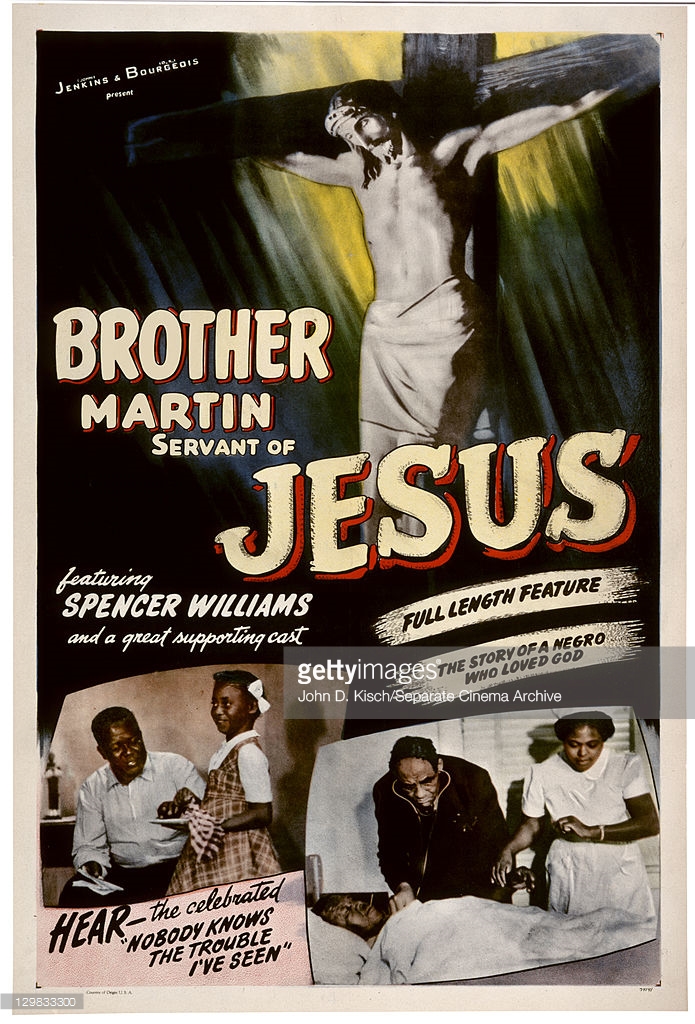Brother Martin: Servant of Jesus (lost race film; 1942): Difference between revisions
mNo edit summary |
m (Spelling error) |
||
| Line 10: | Line 10: | ||
Williams plays an uncle who discusses the life of Martin de Porres with his niece. de Porres was a late sixteenth-century Peruvian who was elevated to sainthood in 1962 by Pope John XXIII.<ref>[http://www.newspaperpost.com/2015/11/23/classic-film-review-brother-martin-servant-of-jesus-1942/ A review of the film.] Retrieved 2 Apr '16.</ref> It came in a series of 1940's religious films by Williams, this with the subtitle: "A story of a Negro that loved God." | Williams plays an uncle who discusses the life of Martin de Porres with his niece. de Porres was a late sixteenth-century Peruvian who was elevated to sainthood in 1962 by Pope John XXIII.<ref>[http://www.newspaperpost.com/2015/11/23/classic-film-review-brother-martin-servant-of-jesus-1942/ A review of the film.] Retrieved 2 Apr '16.</ref> It came in a series of 1940's religious films by Williams, this with the subtitle: "A story of a Negro that loved God." | ||
This is the only film by Williams considered to be lost. No film archives are known to hold a print, but a trailer is known to survive and has been seen by Judith Weisenfeld, author of ''Hollywood be Thy Name: African American Religion in American Film, 1929-1949''. She references it shortly in the book, saying: "The advertising trailer for ''Brother Martin'' gives little sense of the film's narrative, focusing instead on introducing the figure of Martin de Porres and the elements of his history that led to his | This is the only film by Williams considered to be lost. No film archives are known to hold a print, but a trailer is known to survive and has been seen by Judith Weisenfeld, author of ''Hollywood be Thy Name: African American Religion in American Film, 1929-1949''. She references it shortly in the book, saying: "The advertising trailer for ''Brother Martin'' gives little sense of the film's narrative, focusing instead on introducing the figure of Martin de Porres and the elements of his history that led to his beatification."<ref>[https://books.google.com/books?id=QNV9LeA4QGcC&pg=PA124&lpg=PA124&dq=brother+martin+servant+of+jesus+1942&source=bl&ots=_0KPNk8gbv&sig=1Ug9Nzve32jUzfG1kpCKyDOsZ3A&hl=en&sa=X&ved=0ahUKEwjk2_3xn_HLAhVDrB4KHXljAyYQ6AEIOjAG#v=onepage&q=brother%20martin%20servant%20of%20jesus%201942&f=false ''Hollywood be Thy Name: African American Religion in American Film, 1929-1949'' by Judith Weisenfeld.] Retrieved 2 Apr '16.</ref> | ||
==References== | ==References== | ||
Revision as of 22:24, 7 April 2016
Brother Martin: Servant of Jesus is a 1942 religious film written by, directed by, and starring Spencer Williams.[1] The film belongs to the race film genre, consisting of all-black casts that tailored to African-American interests of the time. It's also noteworthy for containing a version of the famous spiritual song "Nobody Knows the Troubles I've Seen."
Williams plays an uncle who discusses the life of Martin de Porres with his niece. de Porres was a late sixteenth-century Peruvian who was elevated to sainthood in 1962 by Pope John XXIII.[2] It came in a series of 1940's religious films by Williams, this with the subtitle: "A story of a Negro that loved God."
This is the only film by Williams considered to be lost. No film archives are known to hold a print, but a trailer is known to survive and has been seen by Judith Weisenfeld, author of Hollywood be Thy Name: African American Religion in American Film, 1929-1949. She references it shortly in the book, saying: "The advertising trailer for Brother Martin gives little sense of the film's narrative, focusing instead on introducing the figure of Martin de Porres and the elements of his history that led to his beatification."[3]
References
- ↑ Wikipedia article. Retrieved 2 Apr '16.
- ↑ A review of the film. Retrieved 2 Apr '16.
- ↑ Hollywood be Thy Name: African American Religion in American Film, 1929-1949 by Judith Weisenfeld. Retrieved 2 Apr '16.
